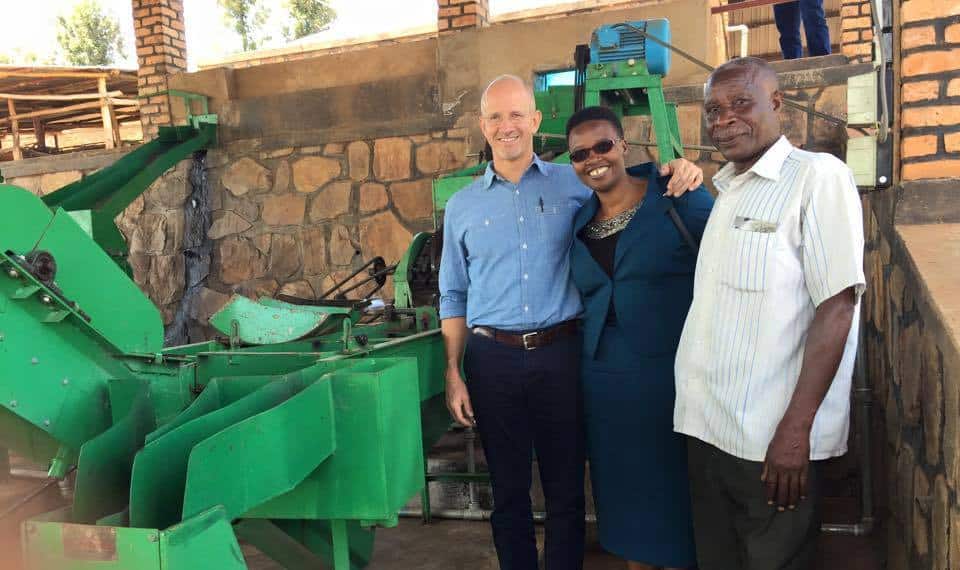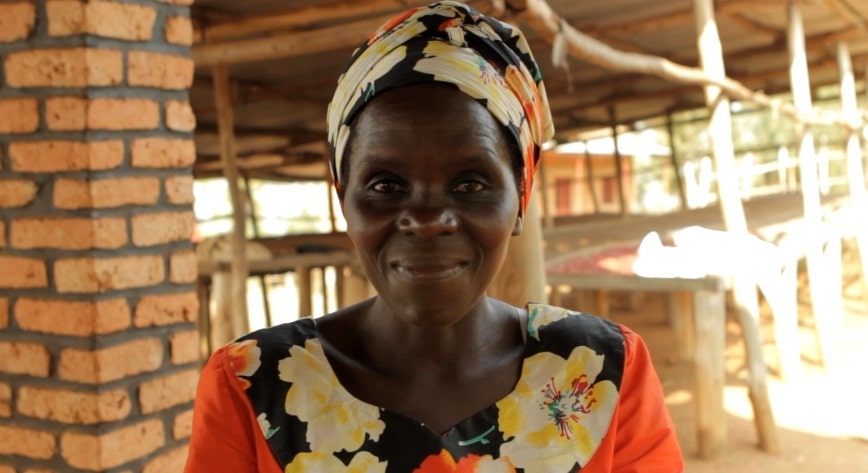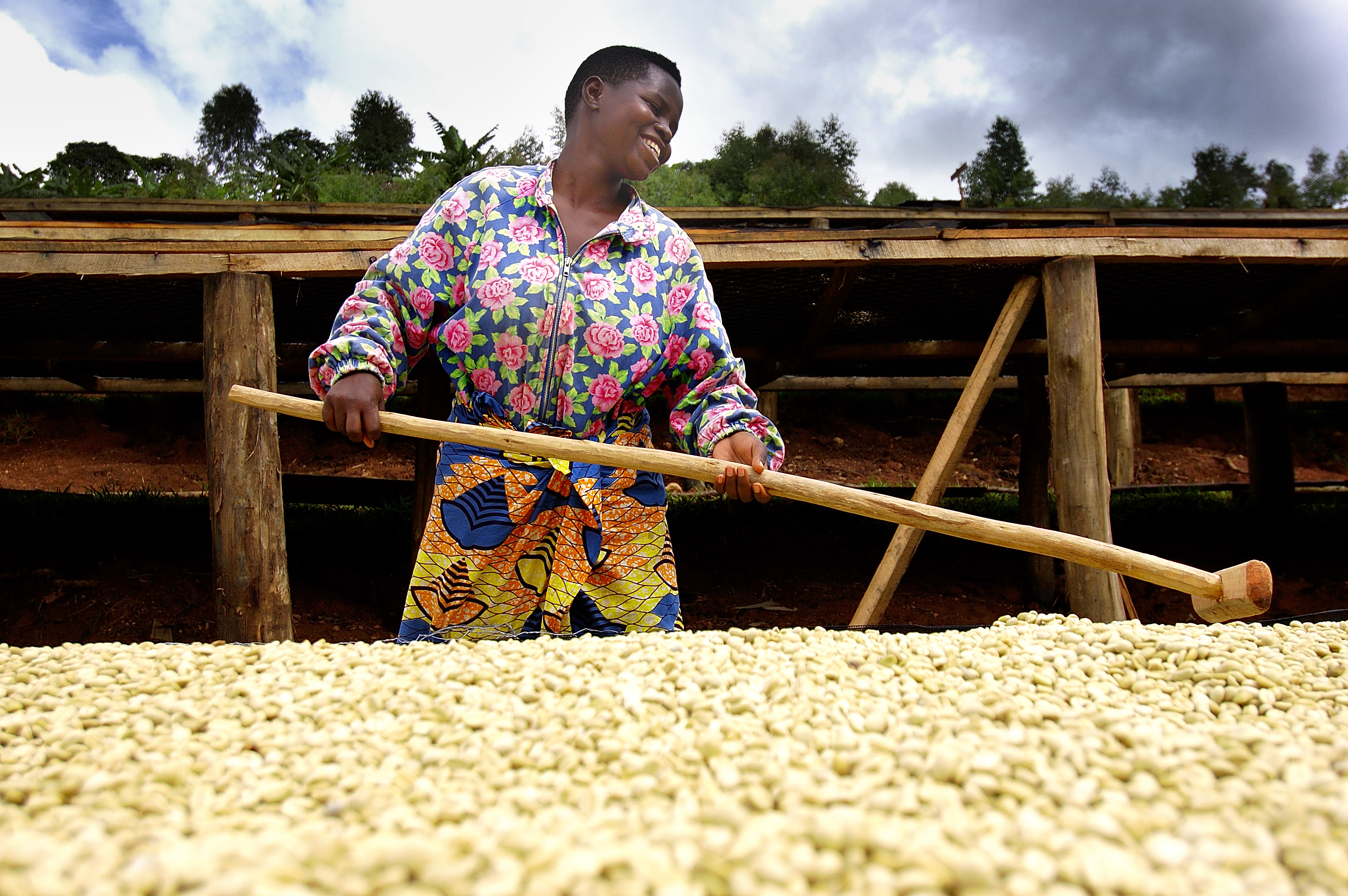On a summer evening in Cambridge, MA, author, educator, and former ambassador Swanee Hunt sat down with activist Chantal Kayitesi and Root Capital founder and CEO Willy Foote to discuss the important role that women have played in Rwanda’s recovery from conflict. Hunt is the author of Rwandan Women Rising, a book she wrote to celebrate the visionary women who are paving the road to Rwanda’s recovery and reconciliation in the wake of the 1994 genocide.
Since Root Capital began lending in Rwanda in 2004, we’ve met countless women farmers, entrepreneurs, and business leaders who strive to build sustainable futures for themselves, their families, and their country. Although Rwanda’s recovery from the genocide is far from over, the accomplishments of its women leaders teach us valuable lessons about what a society can achieve when it supports the rise of women.

Root Capital founder and CEO Willy Foote with Angelique Karekezi (RWASHOSCCO) and Minani Anasthase (Musasa).
Recovery doesn’t happen overnight.
Visiting Rwanda today, it’s easy to forget that less than 25 years ago, 100 days of genocide ripped the country apart. It’s equally easy to label this remarkable recovery a miracle — when in fact it’s anything but. Indeed, says Hunt, “It may seem that women rose naturally from the conflict as leaders, but they took initiative and had to work hard to continue…an infrastructure that was historically male.”
Women like Angelique Karekezi, the managing director of the Rwanda Smallholder Specialty Coffee Company (Rwashoscco), have risen to this challenge. Under Angelique’s leadership, the six coffee businesses operating under the Rwashoscco name — all of whom are financed by Root Capital — have generated higher and more stable incomes for over 15,000 coffee farmers. Walking through one of the washing stations operated by Rwashoscco, Angelique remarked, “this building has become a meeting and healing place for our members.” Thriving agricultural businesses such as hers have far-reaching benefits: their impact ripples outward, buoying up entire rural communities.
Higher incomes, stable employment, a place of healing — far from being “miracles,” these are the results of the hard work of Rwandans like Angelique, who are determined to see their country and its people move forward and succeed.

Bertha Nzabanita, producer-member and buyer, Musasa Cooperative.
It’s Rwanda’s women who will empower the next generation to rise.
When their incomes rise, women invest in families and communities: nutritious food, essential medicine, education. The women of Rwanda are no exception.
One of these women is Bertha Nzabanita, a genocide survivor who grows coffee and works as a buyer for the Musasa cooperative, Root Capital’s first client business in Africa. After her husband died in the conflict, Bertha was left with just a single coffee field and a house in dire need of repair. But when she joined the cooperative, she saw her income rise — and she spent that money wisely. She made necessary improvements to her home. She purchased more coffee fields, which allowed her to produce more coffee and maximize her earning potential. And she invested in her child’s future. “Working with the cooperative,” says Bertha, “I have paid school fees for my child. Now he’s finishing studies at the university this August!”
Hunt points to the importance of remembering “the women at the grassroots.” Says Hunt, we must recognize that lasting progress must begin with the women living at the margins of society — women like Bertha. With just a little bit of support, these women have enormous potential to contribute to the positive development of their community for generations to come.

Producer-member of Maraba cooperative sorts drying coffee.
Rwandan women rising: a lesson for all of us.
Less than a quarter-century after an unthinkable tragedy, Rwanda is achieving remarkable success — in large part because of the hard work of its women. Hunt and Kayitesi shared the stories of women across the country who have risen to the challenge of helping their country progress towards peace. From our own unique vantage point, we’ve seen this progress through the lens of agriculture and entrepreneurship. We’ve seen firsthand the sheer power that women in agriculture can have — from leaders like Angelique who generate higher incomes and stable employment for thousands of people, to farmers like Bertha who work hard to make sure that the next generation has more opportunities than her own.
At the end of the interview, Hunt turned her gaze from Rwanda to the United States. With our increasingly divided nation in mind, Hunt says, “maybe what we should do here is have more women in our decision-making, because I think they’d figure out what to do”.
There is power and truth in her vision. When we look at the remarkable progress of the women of Rwanda — farmers, activists, mothers, local leaders, politicians and more — we see the story of a society who recognizes that its own success is dependent on the success of its women.
Rwandan women rising. Rwanda rising. They’re one and the same.
Whether it’s in Rwanda, Colombia, or Guatemala, many of our clients are playing their part to help post-conflict regions rebuild. Read more about how these businesses promote progress towards peace.

